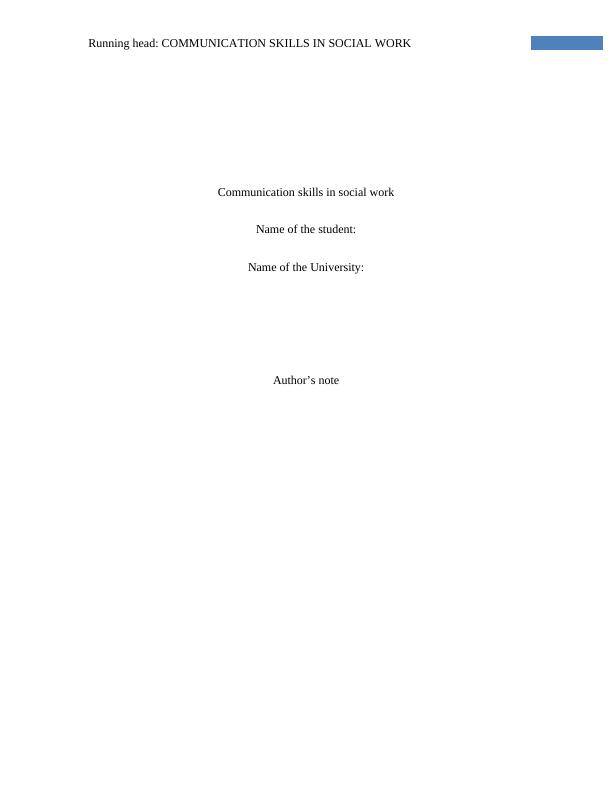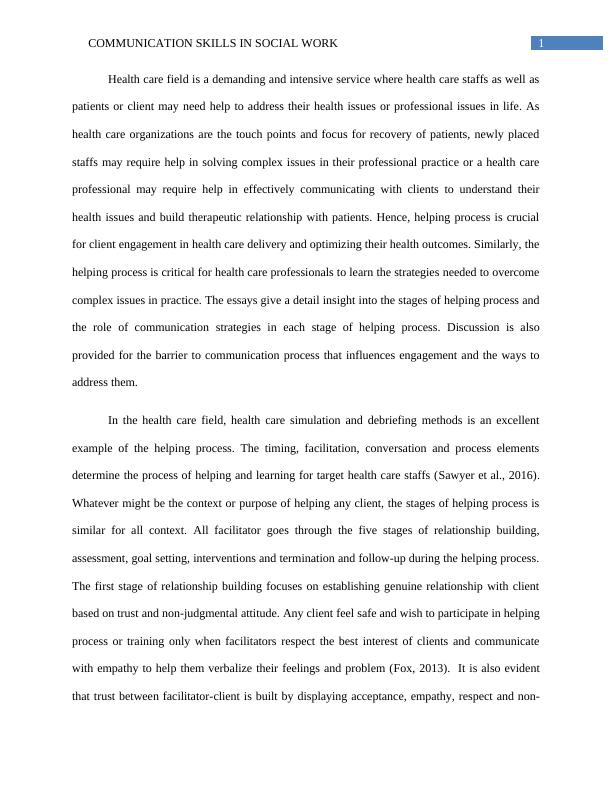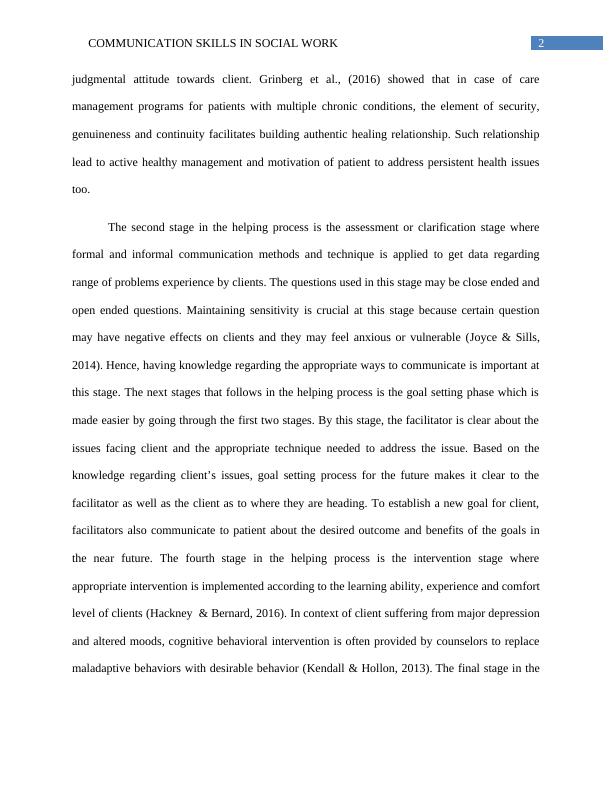Assignment on Communication Skills in Social Work
Added on 2020-05-08
9 Pages2294 Words279 Views
Running head: COMMUNICATION SKILLS IN SOCIAL WORKCommunication skills in social workName of the student:Name of the University:Author’s note

1COMMUNICATION SKILLS IN SOCIAL WORKHealth care field is a demanding and intensive service where health care staffs as well aspatients or client may need help to address their health issues or professional issues in life. Ashealth care organizations are the touch points and focus for recovery of patients, newly placedstaffs may require help in solving complex issues in their professional practice or a health careprofessional may require help in effectively communicating with clients to understand theirhealth issues and build therapeutic relationship with patients. Hence, helping process is crucialfor client engagement in health care delivery and optimizing their health outcomes. Similarly, thehelping process is critical for health care professionals to learn the strategies needed to overcomecomplex issues in practice. The essays give a detail insight into the stages of helping process andthe role of communication strategies in each stage of helping process. Discussion is alsoprovided for the barrier to communication process that influences engagement and the ways toaddress them. In the health care field, health care simulation and debriefing methods is an excellentexample of the helping process. The timing, facilitation, conversation and process elementsdetermine the process of helping and learning for target health care staffs (Sawyer et al., 2016).Whatever might be the context or purpose of helping any client, the stages of helping process issimilar for all context. All facilitator goes through the five stages of relationship building,assessment, goal setting, interventions and termination and follow-up during the helping process.The first stage of relationship building focuses on establishing genuine relationship with clientbased on trust and non-judgmental attitude. Any client feel safe and wish to participate in helpingprocess or training only when facilitators respect the best interest of clients and communicatewith empathy to help them verbalize their feelings and problem (Fox, 2013). It is also evidentthat trust between facilitator-client is built by displaying acceptance, empathy, respect and non-

2COMMUNICATION SKILLS IN SOCIAL WORKjudgmental attitude towards client. Grinberg et al., (2016) showed that in case of caremanagement programs for patients with multiple chronic conditions, the element of security,genuineness and continuity facilitates building authentic healing relationship. Such relationshiplead to active healthy management and motivation of patient to address persistent health issuestoo. The second stage in the helping process is the assessment or clarification stage whereformal and informal communication methods and technique is applied to get data regardingrange of problems experience by clients. The questions used in this stage may be close ended andopen ended questions. Maintaining sensitivity is crucial at this stage because certain questionmay have negative effects on clients and they may feel anxious or vulnerable (Joyce & Sills,2014).Hence, having knowledge regarding the appropriate ways to communicate is important atthis stage. The next stages that follows in the helping process is the goal setting phase which ismade easier by going through the first two stages. By this stage, the facilitator is clear about theissues facing client and the appropriate technique needed to address the issue. Based on theknowledge regarding client’s issues, goal setting process for the future makes it clear to thefacilitator as well as the client as to where they are heading. To establish a new goal for client,facilitators also communicate to patient about the desired outcome and benefits of the goals inthe near future. The fourth stage in the helping process is the intervention stage whereappropriate intervention is implemented according to the learning ability, experience and comfortlevel of clients (Hackney & Bernard, 2016). In context of client suffering from major depressionand altered moods, cognitive behavioral intervention is often provided by counselors to replacemaladaptive behaviors with desirable behavior (Kendall & Hollon, 2013).The final stage in the

End of preview
Want to access all the pages? Upload your documents or become a member.
Related Documents
Effective Communication Skills and Medication Management for Mental Health Patientslg...
|9
|1966
|264
Professional identity nursing Assignment 2022lg...
|5
|783
|11
Importance of Therapeutic Relationship in Treating Depressionlg...
|7
|1536
|97
Nurses’ and Patients’ Communication and Interactions Reportlg...
|6
|1423
|272
Counselling: Person-Centered and Cognitive Behavioral Techniqueslg...
|11
|2686
|355
Importance of Therapeutic Relationship in Counsellinglg...
|8
|2556
|325
